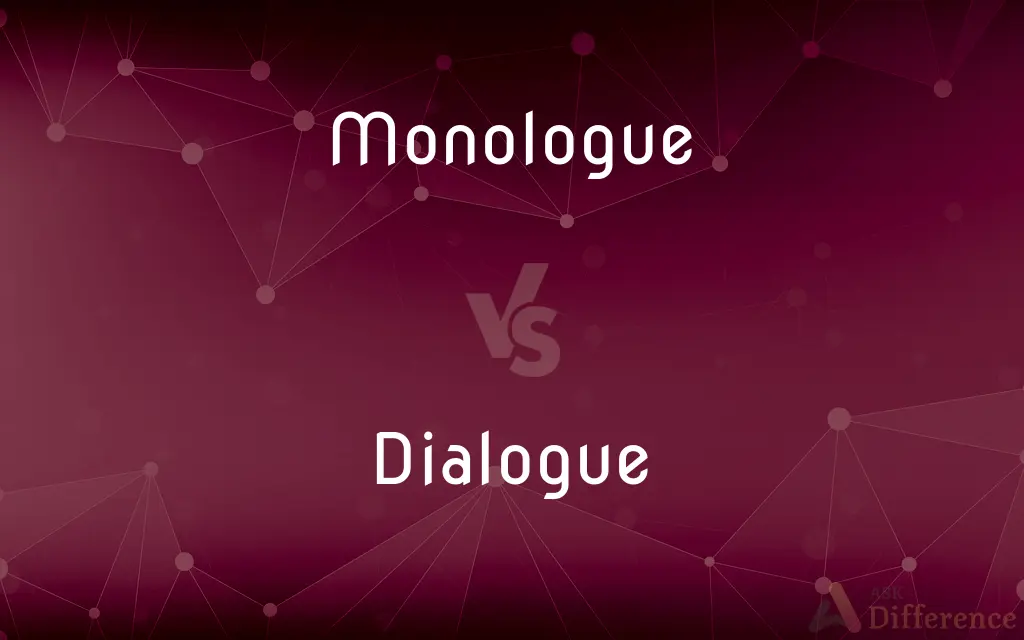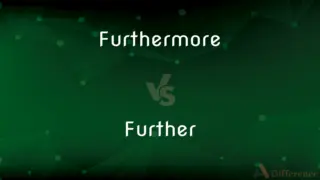Monologue vs. Dialogue — What's the Difference?
By Tayyaba Rehman — Updated on September 26, 2023
A "Monologue" is a prolonged speech by a single speaker, while a "Dialogue" is a conversation between two or more individuals. Both are forms of speech or written exchanges in narratives or performances.

Difference Between Monologue and Dialogue
Table of Contents
ADVERTISEMENT
Key Differences
"Monologue" and "Dialogue" are both vital components in literature, theater, and everyday communication. A Monologue refers to a prolonged speech delivered by a single individual. This can be seen in plays where a character might express their thoughts, feelings, or narrate an event uninterrupted. Conversely, a Dialogue is when two or more individuals engage in a conversation, sharing perspectives, and interacting with one another.
In theater and films, a Monologue can serve as a powerful tool, giving insight into a character's psyche. Shakespeare's soliloquies, for example, are iconic Monologues that offer deep introspection. On the other hand, Dialogues drive the narrative forward, facilitate character development, and build tension or resolve conflicts. Scenes with characters conversing, debating, or even arguing are instances of Dialogue.
From a structural perspective, a Monologue doesn't necessitate the presence of another character on stage or in the narrative context, though others can be present. The focus remains on the singular speaker and their extended speech. In contrast, Dialogues rely on the exchange of words and require at least two active participants to create a back-and-forth interaction.
In everyday life, Monologues might be rare but can be observed in instances like lectures or presentations where one person speaks at length. Dialogues, however, are commonplace, forming the basis of most interpersonal communications, from casual chats to formal discussions.
Comparison Chart
Participants
One speaker
Two or more individuals
ADVERTISEMENT
Function
Offers insight into a character's thoughts
Drives narrative, shows character interactions
Presence
Doesn't require others' presence
Requires at least two participants
Example
Soliloquies in plays
Conversations in novels
Usage
Extended speech by an individual
Conversation between characters
Compare with Definitions
Monologue
An extended speech by one person.
The lead actor's Monologue moved the audience to tears.
Dialogue
Conversational elements in written works.
Their Dialogue was filled with wit and sarcasm.
Monologue
An uninterrupted speech in literature or drama.
The villain's Monologue unveiled his motives.
Dialogue
A conversation between two or more characters.
The Dialogue between the protagonists clarified the plot.
Monologue
A solitary reflection presented as speech.
His Monologue gave insight into his conflicted soul.
Dialogue
An exchange of views or ideas in literature.
The Dialogue in the novel highlighted cultural differences.
Monologue
A single person's discourse in a play or performance.
The play began with a powerful Monologue about love.
Dialogue
The verbal exchange between individuals.
The Dialogue between the two leaders was historic.
Monologue
In theatre, a monologue (from Greek: μονόλογος, from μόνος mónos, "alone, solitary" and λόγος lógos, "speech") is a speech presented by a single character, most often to express their thoughts aloud, though sometimes also to directly address another character or the audience. Monologues are common across the range of dramatic media (plays, films, etc.), as well as in non-dramatic media such as poetry.
Dialogue
Dialogue (sometimes spelled dialog in American English) is a written or spoken conversational exchange between two or more people, and a literary and theatrical form that depicts such an exchange. As a philosophical or didactic device, it is chiefly associated in the West with the Socratic dialogue as developed by Plato, but antecedents are also found in other traditions including Indian literature.
Monologue
A long speech by one actor in a play or film, or as part of a theatrical or broadcast programme
He was reciting some of the great monologues of Shakespeare
He had a long and exacting monologue at the end of the film
Dialogue
A conversation between two or more people.
Monologue
A lengthy, uninterrupted speech by a single character, as in a play or novel.
Dialogue
A discussion of positions or beliefs, especially between groups to resolve a disagreement.
Monologue
A literary composition in monologue form.
Dialogue
Conversation between characters in a drama or narrative.
Monologue
A continuous series of jokes or comic stories delivered by one comedian.
Dialogue
The lines or passages in a script that are intended to be spoken.
Monologue
A long speech made by one person, often monopolizing a conversation.
Dialogue
A literary work written in the form of a conversation
The dialogues of Plato.
Monologue
To give or perform a monologue.
Dialogue
(Music) A composition or passage for two or more parts, suggestive of conversational interplay.
Monologue
To address a monologue to.
Dialogue
To express as or in a dialogue
Dialogued parts of the story.
Monologue
A long speech by one person in a play; sometimes a soliloquy; other times spoken to other characters.
Dialogue
To engage in a dialogue.
Monologue
(comedy) A long series of comic stories and jokes as an entertainment.
Dialogue
A conversation or other form of discourse between two or more individuals.
Bill and Melinda maintained a dialogue via email over the course of their long-distance relationship.
Start up a dialogue
Monologue
A long, uninterrupted utterance that monopolizes a conversation.
Dialogue
(authorship) In a dramatic or literary presentation, the verbal parts of the script or text; the verbalizations of the actors or characters.
The movie had great special effects, but the dialogue was lackluster.
Monologue
To deliver a monologue.
Dialogue
(philosophy) A literary form, where the presentation resembles a conversation.
A literary historian, she specialized in the dialogues of ancient Greek philosophers.
Monologue
A speech uttered by a person alone; soliloquy; also, talk or discourse in company, in the strain of a soliloquy; as, an account in monologue.
Dialogue
(computing) A dialogue box.
Once the My Computer dialogue opens, select Local Disk (C:), then right click and scroll down.
Monologue
A dramatic composition for a single performer.
Dialogue
To discuss or negotiate so that all parties can reach an understanding.
Pearson wanted to dialogue with his overseas counterparts about the new reporting requirements.
Monologue
Speech you make to yourself
Dialogue
(transitive) To put into dialogue form.
Monologue
A long utterance by one person (especially one that prevents others from participating in the conversation)
Dialogue
(obsolete) To take part in a dialogue; to dialogize.
Monologue
A (usually long) dramatic speech by a single actor
Dialogue
A conversation between two or more persons; particularly, a formal conservation in theatrical performances or in scholastic exercises.
Monologue
A literary device for character introspection.
Her Monologue revealed her deepest fears and desires.
Dialogue
A written composition in which two or more persons are represented as conversing or reasoning on some topic; as, the Dialogues of Plato.
Dialogue
To take part in a dialogue; to dialogize.
Dialogue
To express as in dialogue.
And dialogued for him what he would say.
Dialogue
A conversation between two persons
Dialogue
The lines spoken by characters in drama or fiction
Dialogue
A literary composition in the form of a conversation between two people;
He has read Plato's Dialogues in the original Greek
Dialogue
A discussion intended to produce an agreement;
The buyout negotiation lasted several days
They disagreed but kept an open dialogue
Talks between Israelis and Palestinians
Dialogue
Spoken interactions in plays, movies, or novels.
Sharp Dialogue made the screenplay come alive.
Common Curiosities
Which is more common in theatrical performances?
Both are common, but the prevalence depends on the script's narrative and style.
Can a Monologue occur within a Dialogue?
Yes, a character might have an extended Monologue within a larger Dialogue.
What's the primary difference between Monologue and Dialogue?
A Monologue is an extended speech by one person, while Dialogue is a conversation between two or more.
Are soliloquies and Monologues the same?
A soliloquy is a type of Monologue, often revealing inner thoughts when the character believes they're alone.
Can Dialogues have more than two participants?
Absolutely, Dialogues can involve multiple participants conversing.
Share Your Discovery

Previous Comparison
Furthermore vs. Further
Next Comparison
Testimonial vs. TestimonyAuthor Spotlight
Written by
Tayyaba RehmanTayyaba Rehman is a distinguished writer, currently serving as a primary contributor to askdifference.com. As a researcher in semantics and etymology, Tayyaba's passion for the complexity of languages and their distinctions has found a perfect home on the platform. Tayyaba delves into the intricacies of language, distinguishing between commonly confused words and phrases, thereby providing clarity for readers worldwide.















































